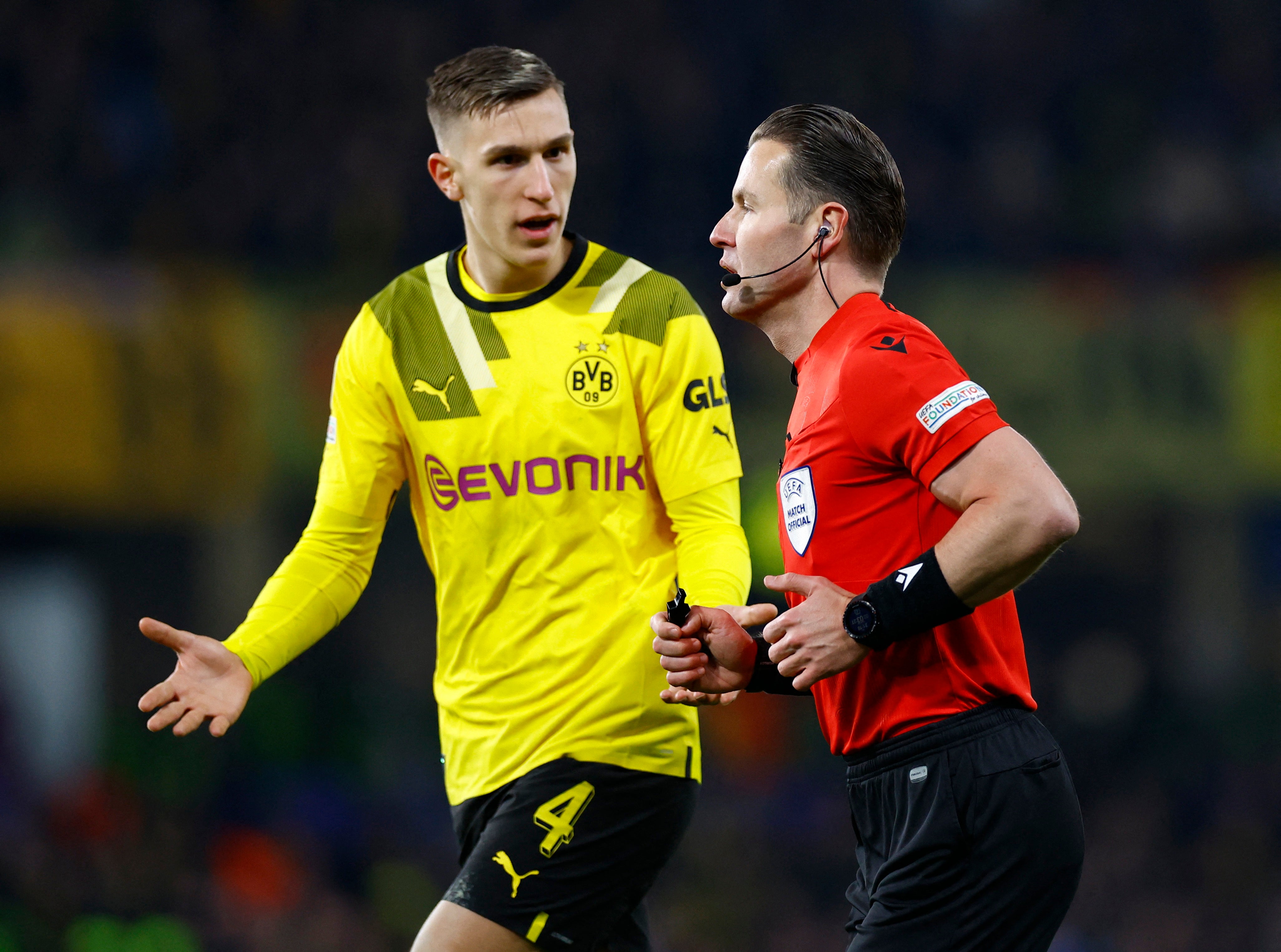Dortmund’s defeat at Chelsea was not unlucky – it was an act of self-sabotage
In the era of VAR, encroachment is now futile and Dortmund’s players have only themselves to blame for gifting Kai Havertz a second chance to score from the penalty spot

The Dortmund manager, Edin Terzic, didn’t want to talk about it. His midfield talisman, Jude Bellingham, said it was a “joke”. Even ex-Chelsea pundit Joe Cole, not so much wearing a cap as balancing a giant Tunnock’s teacake on his head, appeared from beneath its rim to say he didn’t like Champions League games being decided that way. But what no one seemed willing to say was that Borussia Dortmund had lost the game by an act of needless self-sabotage.
To recap, at 1-1 on aggregate in their Champions League last-16 second leg, inside a raucous Stamford Bridge, Chelsea were awarded a penalty to take the lead. The handball decision was debatable but what followed was not. Kai Havertz stepped and stuttered and let goalkeeper Alexander Meyer dive before aiming the other way, but his penalty hit the post and rebounded to Dortmund midfielder Salih Ozcan who gleefully cleared it away.
Yet VAR spotted Ozcan had stepped inside the penalty-box arc before it had been taken, and so Havertz was given another attempt, and this time he scored. Dortmund were desolate, Chelsea buoyed, and they went on to take their place in the quarter-finals.
Before VAR, encroachment was almost always a risk worth taking. Referees generally didn’t penalise a player following in a little too early and that leniency was one of the game’s unwritten rules: pinch a yard, but no more.
But in the modern era of the Video Assistant Referee, at the highest level, encroachment is futile. If the penalty is scored, an encroaching defender clearly makes no difference to the outcome; if the penalty is saved or hits the post, and the encroaching defender then clears the ball, the penalty is almost always retaken (unless VAR deems nothing was gained).
Put simply, there is no longer any benefit to encroachment.
The problem is that it is one of football’s instinctive acts which are so hard to undo. It is ingrained in every young footballer from childhood to race to the rebound should it fall, a worthy mission, and that is how Bellingham saw it.
“The fact they’ve had a retake was a joke,” he said. “For every penalty, especially when he has a slow run-up, there’s going to be people encroaching into the box by a yard or so. That’s the game I suppose. He’s made the decision and we have to live with it.”
His teammate, the former Liverpool midfielder Emre Can, was less philosophical and blamed “arrogant” referee Danny Makkelie for Dortmund’s defeat.
“It was his fault today,” Can said. “How can you give the second penalty in the situation? How does it work? That simply does not work. I don’t give a s**t who walked in [the box] before [the penalty was taken]. He was arrogant the whole game, that’s where it starts. We lost here undeservedly because of the referee.”
Their frustration was understandable at the end of a tense tie, but the moment they pinpointed as a turning point was Dortmund’s own doing.
If there was a little scope for disgruntlement over the call, it was only because the laws of the game state that encroachment should be penalised if the defender “prevents an attacker playing or being able to play the ball in a situation where a goal might be scored” – so the encroaching defender must interfere with the attacking team’s attempts to score. It is questionable whether the rebound would have reached Chelsea midfielder Enzo Fernandez waiting on the edge of the box had Ozcan not cleared it, but then the Dortmund midfielder still needn’t have taken the risk.
And so, if encroachment is automatic, then every player needs deprogramming and rewiring. Coaches need to get through to their team however possible: explain the rules, warn of the consequences, even threaten them with fined wages.
In time, encroachment will die out as more and more penalties are awarded, causing a gradual shift in behaviour in the same way tackling has changed over time in response to harsher punishments. But for the biggest clubs playing for the highest stakes, there is no time to wait: players must abandon football’s inexcusable act of self-harm.
Join our commenting forum
Join thought-provoking conversations, follow other Independent readers and see their replies
Comments

Bookmark popover
Removed from bookmarks